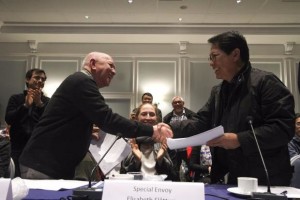PH, NDFP sign guidelines on rights violation complaints

Chief peace negotiators Fidel Agcaoili of the NDFP and Silvestre Bello III of the Philippine government shake hands after signing the supplemental guidelines. Looking on is Elisabeth Slattum, Norwegian special envoy. (Photo by KARLO MANLUPIG/Inquirer Mindandao)
ROME, Italy — The Philippine government and the National Democratic Front of the Philippines (NDFP) have just signed the supplemental guidelines of the Joint Monitoring Committee (JMC), considered as one of the major gains in the third round of talks, which are taking place here in the Italian capital.
Fidel Agcaoili, peace panel chair of the NDFP, said on Saturday that the document had been in the making since 2007 but had been hampered by the intermittent talks and many unresolved issues, including the spiraling of human rights abuses in the past administration.
Agcaoili said that the supplemental guidelines would help make it easier and faster to process complaints of violations to the Comprehensive Agreement on Respect for Human Rights and International Humanitarian Law (CARHRHIL).
The supplemental guidelines would also help in laying down the mechanisms how the complaints will be dealt by the parties.
The agreement was signed in 1998, but it’s only now that the processing of complaints will be implemented.
Article continues after this advertisement“The full operation of the Joint Monitoring Committee with its supplemental guidelines in place should not be difficult under our legal regime that includes new and bold laws and statutes upholding human rights and international humanitarian laws, such as the law against enforced disappearance, anti-torture act, IHL act, Human Security Act, Writ of Amparo and the Writ of Kalikasan, among others,” Silvestre Bello III, chief government negotiator, said.
Article continues after this advertisementBello said that the signing was an affirmation of commitment of President Rodrigo Duterte to the international humanitarian law as a component of the peace process.
In a copy of the supplemental guidelines obtained by the Inquirer, the document has 10 articles:
- Purpose and coverage
- Mandate of the JMC
- Complaints
- Other documents and information
- Receipt and action on the complaints, documents and information
- Protection of victims, witnesses, complainants and the confidentiality of information
- Meetings and communications of JMC
- Functions of the joint secretariat
- Role of the third party facilitator
- Amendments
But both parties are now optimistic that there would be better relations and conditions to handle and resolve complaints to create a better atmosphere not just to end the conflict but also to address the injustices that happened in the past. /ATM